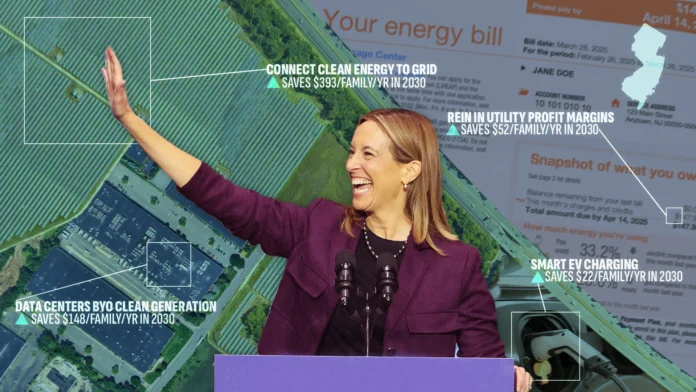New Jersey families and businesses are facing a winter of uncertainty as electric and gas bills continue to climb, prompting voters to demand faster, more decisive action from policymakers. Throughout 2025, energy issues have dominated headlines and fueled political debates, particularly during the recent gubernatorial race. Utility rate increases that hit New Jerseyans in June—some as high as 20%—served as a flashpoint, reminding residents that energy affordability is now a pressing concern that affects every household and business across the state.
Polling data confirms the growing public anxiety. In July, Stockton University’s William J. Hughes Center for Public Policy examined how rising energy costs are reshaping household budgets. Their findings were stark: 70% of respondents reported significant or moderate increases in electricity bills over the past year, while 52% said the same for gas bills. Nearly half of all households (48%) said they had to adjust their budgets just to keep up with utility payments, and 47% noted that these increases had altered their spending habits more broadly. When asked who bears responsibility for rising costs, more than half of New Jerseyans pointed to utility companies, while roughly 47% held state elected officials accountable. Large corporations, businesses, and federal policies were also frequently cited.
This heightened awareness of energy issues has created a rare moment of bipartisan concern. According to an October poll conducted by Fairleigh Dickinson University in partnership with the Commerce and Industry Association of New Jersey, voters across party lines support the construction of new natural gas plants as a tool to stabilize and lower energy prices. Overall, 64% of respondents favored new gas facilities, compared to 22% who preferred waiting for alternative energy solutions. While support is stronger among Republicans—nearly 89% in favor—Democrats also leaned toward construction, with 46% supporting new plants and outnumbering those opposed.
FDU Poll Executive Director Dan Cassino described this shift as a “real change in rhetoric” among Democrats. “Politicians are responding to the public, and the public wants action quickly,” Cassino said. Anthony Russo, president of the Commerce and Industry Association of New Jersey, echoed that sentiment, noting that voters overwhelmingly back an “all-of-the-above” energy approach to expand supply and lower costs.
Governor-elect Mikie Sherrill has already laid out a plan to address rising utility bills, including a temporary freeze on rates and an emphasis on expanding cleaner and more efficient power generation. Her proposals span solar and battery storage projects, upgrades to existing nuclear plants, and modernization of natural gas facilities. Sherrill also stressed cutting red tape and expediting permitting processes to accelerate energy projects while increasing transparency from utilities. Her plan reflects a broader consensus that New Jersey cannot afford delays, given that building a new gas plant can take five or more years, and nuclear projects can take over a decade.
Republican gubernatorial candidate Jack Ciattarelli emphasized a parallel strategy, calling for an all-of-the-above energy approach that includes multiple natural gas plants, expanded nuclear capacity in South Jersey, rooftop solar development, and exploration of new technologies. However, his platform also called for halting offshore wind projects along the Jersey coast, withdrawing from the Regional Greenhouse Gas Initiative, and rolling back state mandates on electric vehicles and home construction.
Public opinion continues to favor practical solutions. In an FDU poll from late October, voters strongly supported policies such as requiring energy-intensive facilities like data centers to pay higher rates, building additional natural gas plants, increasing oversight of power producers, and expanding nuclear generation. Cassino noted, however, that partisan divisions still influence opinions. “Even as people want lower energy bills, political loyalties often shape their preferences,” he said.
Business leaders are also urging swift action. At the New Jersey Business & Industry Association’s fifth Annual Energy & Environmental Policy Forum, executives from PSEG and South Jersey Industries emphasized the need for immediate collaboration to strengthen the state’s grid and increase energy capacity. “We cannot sit around,” said PSEG CEO Ralph LaRossa, highlighting the long timelines required to build new plants. SJI CEO Mike Renna added that utilities remain critical to the state’s economic growth, collectively investing billions in New Jersey’s infrastructure each year.
The combination of rising costs, public concern, and business pressure has created a climate where energy policy is at the forefront of both political and economic discussions. Voters, business leaders, and policymakers alike recognize that New Jersey families and companies need tangible solutions to relieve financial pressures and stabilize the state’s energy future. For those seeking more insight into how these developments affect the Garden State economy, and the broader business landscape, exploring New Jersey business resources offers valuable context and updates.












